Turning the heat up on election security

Members of law enforcement stand watch over a gathering on a sidewalk in protest of the election process in front of the Maricopa County Tabulation and Election Center on November 14, 2022 in Phoenix, Arizona. Jon Cherry/Getty Images
With the 2024 presidential election rapidly approaching, Arizona’s secretary of state pushes to protect election systems from outside threats.
Arizona Secretary of State Adrian Fontes is prioritizing election systems security with a $3 million budget request for fiscal year 2024 that would increase cybersecurity, safeguard state databases against hacks and improve voter registration systems.
In a March 30 hearing before the Arizona House Subcommittee on Fiscal Accountability, Fontes called for increased funding to improve the cybersecurity of elections systems for the state’s 15 counties. Recently, 10 counties have lost top elections officials partially due to threats of violence and intimidation, Fontes said during the hearing.
The 2020 presidential election pushed Maricopa, Arizona, into the spotlight when election deniers, including state officials such as former Rep. Mark Finchem, largely contested the results, claiming votes were rigged against former President Donald Trump.
In an effort to restore voter confidence, one Arizona county invited potential voters to test the accuracy of election machines for themselves, which attracted only two public attendees despite statewide skepticism.
"The threat to our elections posed by hostile states and criminals is real,” Fontes said in a April 10 statement. “Our county elections officials need the training and technology now to adequately respond to these threats in order to protect voters, as well as our critical elections infrastructure."
As part of the total $3 million budget request, an estimated $210,000 would go toward creating the role of a chief information security officer for elections, according to Fontes’ FY 2024 budget request. He is also asking for more than $500,000 to support internet security studies, including penetration testing, to identify and correct IT vulnerabilities as well as enhance existing security systems.
The governor’s fiscal year 2024 executive budget summary released in January, however, allocates just $585,000 for infrastructure cybersecurity initiatives. The funding will enhance testing and patching vulnerabilities in networks and web applications, scanning the dark net for potential threats and vulnerabilities and improving the accuracy of cybersecurity alerts, according to the document.
Meanwhile, Fontes directed his employees to conduct state business only on state-issued technology devices, including secured laptops and cellphones and prohibited the use of all personal social media applications, including TikTok, on state-issued devices. His team has also been working with the Arizona Department of Homeland Security to scan all of the department’s IT systems and begin enhanced maintenance ahead of the 2024 election cycle.
With Arizona’s presidential preference election less than a year away and the state’s Elections Task Force recommendations for improved election infrastructure, equipment and security guidelines due Nov. 1, Fontes said during the hearing, Arizona must invest in the necessary resources now to ensure an accurate and safe election process.






